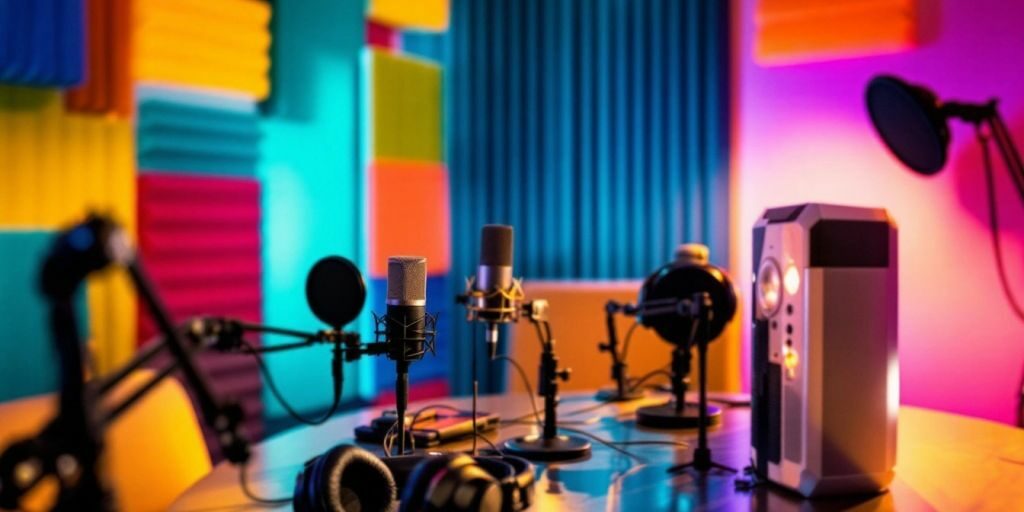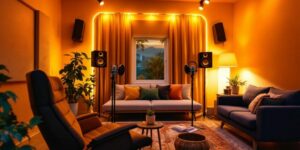Are you ready to dive into the exciting world of podcasting in Phoenix? Whether you’re just starting out or you’re a seasoned pro, this guide will help you navigate the essential steps to record your podcast. From choosing the right studio to post-production tips, we’ve got everything you need to make your podcast a success.
Key Takeaways
- Select a podcast studio in Phoenix that fits your needs and budget.
- Plan your episodes carefully, including intros, outros, and release schedules.
- Utilize professional equipment and in-house engineers for the best sound quality.
- Edit and mix your podcast to enhance the listening experience.
- Promote your podcast effectively to grow your audience.
Choosing the Right Podcast Studio AZ
When it comes to recording your podcast, selecting the right studio is crucial. Here are some important factors to consider:
Factors to Consider When Selecting a Studio
- Location: Choose a studio that is easily accessible to avoid travel hassles.
- Equipment Quality: Ensure the studio has modern and high-quality recording equipment.
- Pricing: Look for transparent pricing with no hidden fees.
Popular Podcast Studios in Phoenix
| Studio Name | Location | Special Features |
|---|---|---|
| AZ Pod Studio | Central Phoenix | In-house audio engineers |
| Phoenix Sound Lab | Downtown Phoenix | Advanced mixing and mastering tools |
| The Podcast Hub | North Phoenix | Community networking opportunities |
Comparing Studio Amenities
- Soundproofing: Check if the studio has soundproof rooms to minimize background noise.
- Support Services: Look for studios that offer editing and post-production services.
- Comfort: A comfortable environment can enhance your recording experience.
Choosing the right studio can make a significant difference in the quality of your podcast. Make sure to visit and assess the studio before booking your session!
Pre-Production Essentials for Your Podcast

Before diving into recording, it’s crucial to lay a solid foundation for your podcast. This phase, known as pre-production, involves several key steps that can significantly enhance the quality and effectiveness of your podcast.
Brainstorming and Structuring Your Podcast
- Identify your podcast’s theme: What topics will you cover?
- Outline episode formats: Will you have interviews, discussions, or solo episodes?
- Create a content calendar: Plan your episodes in advance to maintain consistency.
Creating Custom Intros and Outros
- Craft a catchy intro: This sets the tone for your podcast and grabs listeners’ attention.
- Design a memorable outro: Encourage listeners to subscribe and share your podcast.
- Consider using music: A unique jingle can enhance your brand identity.
Planning Your Recording and Release Schedule
- Set a recording schedule: Consistency is key; decide how often you will release episodes.
- Choose a release day: Pick a day that works best for your audience.
- Plan for flexibility: Life happens; be prepared to adjust your schedule as needed.
Remember, a well-planned podcast can lead to greater listener engagement and satisfaction.
Recording Your Podcast in Phoenix
Recording your podcast in Phoenix can be an exciting experience. Choosing the right studio is crucial to ensure high-quality audio and a smooth recording process. Here are some key points to consider:
Booking Your Studio Time
- Plan ahead: Popular studios can fill up quickly, so it’s best to book your time in advance.
- Flexible hours: Many studios offer flexible recording hours to fit your schedule.
- Hourly rates: Studios often charge by the hour, so you only pay for the time you need.
Equipment and Tools Available
Most podcast studios in Phoenix are equipped with:
- High-quality microphones: Brands like Shure and Audio Technica are common.
- Mixing consoles: Professional audio mixers help ensure your sound is clear and balanced.
- Recording software: Studios typically use industry-standard software for editing and mixing.
| Studio Name | Location | Rate per Hour | Capacity |
|---|---|---|---|
| AZ Pod Studio | Downtown Phoenix | $60 | Up to 4 |
| Modern Podcast Studio | South Mountain Village | $75 | Up to 5 |
| Idea Pro Podcast Studio | Paradise Valley | $85 | Up to 6 |
Working with an In-House Audio Engineer
- Expert guidance: An audio engineer can help you set up and troubleshoot any issues during your recording.
- Comfortable environment: They create a relaxed atmosphere, allowing you to focus on your content.
- Post-recording support: Many engineers also assist with editing and mixing your podcast after recording.
Recording in a professional studio not only enhances the sound quality but also boosts your confidence as a podcaster.
By following these tips, you can ensure a successful recording session in Phoenix, making your podcast stand out in the crowded market.
Post-Production and Editing Services
After you finish recording your podcast, the next step is post-production. This is where the magic happens, turning your raw audio into a polished final product. Here’s what you need to know:
Editing and Mixing Your Podcast
- Remove unwanted sounds: All background noise, pauses, and mistakes are cleaned up.
- Edit requests: You can ask for changes during or after the recording. It’s your choice!
- High-quality output: The final product is mixed and mastered to sound professional.
Adding Sound Effects and Music
- Custom sound effects: You can include unique sounds that match your podcast’s theme.
- Music beds: Background music can enhance the listening experience.
- Voice-over options: Professional voice-overs can be added for intros and outros.
Ensuring High-Quality Output
- Final checks: Before publishing, the audio is reviewed to ensure it meets high standards.
- Multiple formats: Your podcast can be provided in various formats for different platforms.
- Accessibility: We’ll help you get your podcast on major streaming services like Apple Podcasts and Spotify.
Post-production is crucial for making your podcast sound its best. It’s where your ideas come to life and engage your audience effectively!
At-Home Podcast Studio Setup
Setting up a podcast studio at home can be a fun and rewarding experience. Here’s how to create a space that works for you:
Benefits of At-Home Recording
- Convenience: You can record whenever you want without worrying about studio hours.
- Cost-Effective: Save money on studio rentals by investing in your own equipment.
- Personal Touch: Customize your space to reflect your style and creativity.
Essential Equipment for Home Studios
To get started, you’ll need some basic equipment:
- Microphone: A good quality microphone is essential for clear sound.
- Audio Interface: This connects your microphone to your computer.
- Headphones: Use closed-back headphones to monitor your audio without feedback.
| Equipment | Purpose |
|---|---|
| Microphone | Captures your voice |
| Audio Interface | Converts sound for your computer |
| Headphones | Monitors audio |
Tips for Achieving Professional Sound at Home
- Choose the Right Room: Pick a quiet space with minimal background noise.
- Acoustic Treatment: Use soft materials like rugs and curtains to reduce echo.
- Test Your Setup: Record a few test episodes to adjust your equipment and settings.
A home studio is more than just equipment; it’s where your podcasting voice finds its true essence. Investing in the right setup will elevate your brand and attract a more dedicated listenership.
Promoting Your Podcast

Utilizing Social Media
Social media is a powerful tool for getting the word out about your podcast. Here are some effective strategies:
- Create engaging posts that highlight your episodes.
- Use hashtags to reach a wider audience.
- Share behind-the-scenes content to connect with listeners.
Collaborating with Other Podcasters
Working with other podcasters can help you reach new audiences. Consider these approaches:
- Guest appearances on each other’s shows.
- Cross-promotions on social media.
- Joint episodes that combine your audiences.
Engaging with Your Audience
Building a loyal listener base is crucial. Here are some ways to engage:
- Encourage feedback through comments and reviews.
- Host Q&A sessions to answer listener questions.
- Create a newsletter to keep your audience updated.
Remember, promoting your podcast is not just about gaining listeners; it’s about building a community.
By implementing these strategies, you can effectively promote your podcast and grow your audience. Starting a podcast is a strategic move for Arizona business owners, as it helps amplify reach and build relationships in the community.
Monetizing Your Podcast
Sponsorship and Advertising
One of the most common ways to make money from your podcast is through sponsorships. Companies pay you to promote their products or services during your episodes. Here are some tips:
- Choose relevant sponsors: Pick brands that align with your podcast’s theme.
- Be transparent: Always let your audience know when you’re promoting a sponsor.
- Negotiate rates: Don’t be afraid to ask for more if your podcast has a good following.
Creating Premium Content
Another way to earn money is by offering premium content. This could be:
- Exclusive episodes for paying subscribers.
- Behind-the-scenes content.
- Early access to episodes.
Utilizing Crowdfunding Platforms
Crowdfunding can be a great way to support your podcast. Platforms like Patreon allow your listeners to contribute financially. Here’s how to get started:
- Set clear goals: Let your audience know what their contributions will support.
- Offer rewards: Give back to your supporters with special perks.
- Engage with your community: Keep your listeners updated on your progress and involve them in your journey.
Remember, building a loyal audience is key to monetizing your podcast. The more engaged your listeners are, the more likely they are to support you financially.
By exploring these options, you can turn your passion for podcasting into a sustainable income source.
Final Thoughts on Podcasting in Phoenix
In conclusion, starting a podcast in Phoenix is an exciting journey filled with opportunities. With top-notch studios like AZ Pod Studio, you can easily create high-quality content that stands out. Remember, whether you’re just beginning or have experience, the right tools and support can make a big difference. So, gather your ideas, book your studio time, and let your voice be heard. Happy podcasting!
Frequently Asked Questions
What should I look for when choosing a podcast studio in Phoenix?
When picking a podcast studio, consider the equipment, location, and the studio’s experience. Make sure they have the right tools to help you create a great podcast.
How can I prepare for my podcast recording?
Before recording, plan your topics, write an outline, and practice speaking. This will help you sound more confident and organized.
What equipment do I need for at-home podcasting?
For at-home podcasting, you will need a good microphone, headphones, and recording software. You might also want a pop filter to reduce noise.
How do I edit my podcast after recording?
You can use editing software like Audacity or GarageBand. These programs let you cut out mistakes and add music or sound effects.
What are some ways to promote my podcast?
You can share your podcast on social media, ask friends to help spread the word, and reach out to other podcasters for collaboration.
How can I make money from my podcast?
You can earn money through sponsorships, selling merchandise, or offering premium content that listeners can pay for.




